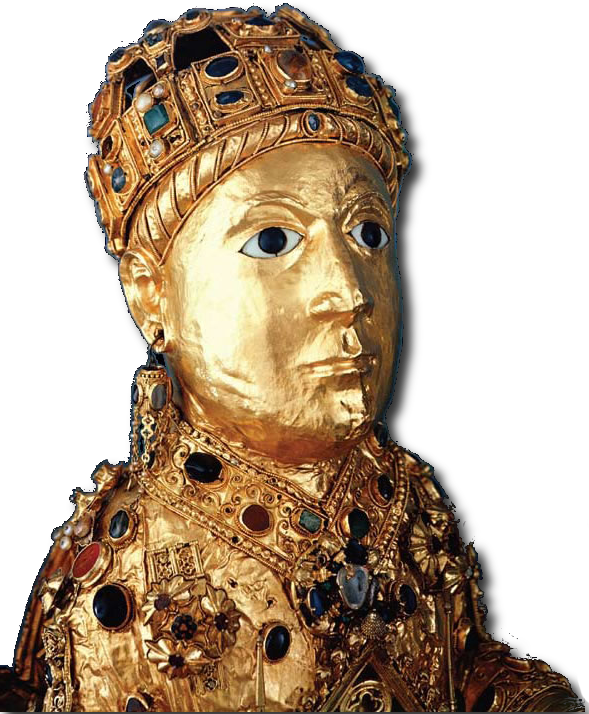 |
MedievalEuropeOnline
the web home of Medieval Europe: A
Short History
|
Chapter 10: States Made and Unmade, c. 1000-1300
ONLINE RESOURCES:
Bayeux Tapestry see also this Animated Bayeux Tapestry
TEST YOURSELF: Have you read Chapter 10 adequately? Test yourself here.
MAPS: Want to download a map from chapter 10? Click here.
TIMELINES: Want to download a timeline from chapter 10? Click here.
CITATIONS: Want to find the source of a quote used in chapter 10? Click here.
HISTORICAL STUDIES:
David Abulafia, Frederick II: A Medieval Emperor (1988).
The best of several accounts of Frederick II. See also his The
Western Mediterranean Kingdoms 1200–1500: The Struggle for Dominion
(1997).
Benjamin Arnold, Medieval Germany 500–1300: A Political
Interpretation (1997). Emphasizes the regionalism of the
medieval German states. See also his Princes and Territories in
Medieval Germany (1991).
John W. Baldwin, The Government of Philip Augustus: Foundations
of French Royal Power in the Middle Ages (1986).
Frank Barlow, Thomas Becket (1986). An astute, even-handed biography. For other biographical treatments, see David Bates, William the Conqueror (2nd edition, 2004); D. A. Carpenter, The Minority of Henry III (1990); Marjorie Chibnall, The Empress Matilda: Queen Consort, Queen Mother and Lady of the English (1991); J. R. Maddicott, Simon de Montfort (1994); D. D. R. Owen, Eleanor of Aquitaine, Queen and Legend (1993); Michael Prestwich, Edward I (1988); Jean Richard, St. Louis: Crusader King of France, trans. Jean Birrell (1992).
Thomas Bisson, The Crisis of the Twelfth Century: Power,
Lordship, and the Origins of European Government (2008). A bold
summation.
Marjorie Chibnall, Anglo-Norman England (2nd edition,
1992). The best survey. See also Michael T. Clanchy, England
and Its Rulers, 1066–1272: Foreign Lordship and National Identity (2nd
edition, 1998), and Richard Mortimer, Angevin England, 1154–1258
(1994). For broader coverage, see especially: Nigel Saul, ed., The
Oxford Illustrated History of Medieval England (1997); C.
Warren Hollister, The Making of England, 55 B.C.
to 1399 (8th edition, 2001); and Edmund King, Medieval
England, 1066–1485 (1988).
Marjorie Chibnall, The Debate on the Norman Conquest (1999).
A brief and accessible introduction to the historiography.
Georges Duby, France in the Middle Ages, 987–1460, trans.
Juliet Vale (1991). A magisterial survey. See also Elizabeth M. Hallam
and Judith Everard, Capetian France, 987–1328 (1980); and
Jean Dunbabin, France in the Making, 843–1180 (2nd
edition, 2000); Jim Bradbury, The Capetians: Kings of France,
987-1328 (2007).
Horst Fuhrmann, Germany in the High Middle Ages, c. 1050–1200, trans.
Timothy Reuter (1986). See also Alfred Haverkamp, Medieval
Germany, 1056–1273, trans. Helga Braun and Richard Mortimer
(2nd edition, 1992). These two works replace all earlier surveys of
the medieval German states.
Leo de Hartog, Genghis Khan: Conqueror of the World (rev.
edition, 2004). First published in Dutch in 1979, this is a
well-received and readable book. See also Peter Jackson, The
Mongols and the West, 1221-1410 (2005).
James C. Holt, Magna Carta (2nd edition, 1992). The definitive study.
John Maddicott, The Origins of the English Parliament, 924-1327 (2010). Long awaited and worth the wait.
PRIMARY SOURCES IN PRINT:
Emilie Amt, Medieval England 1000–1500: A Reader (2000).
New and wide-ranging.
Theodore Evergates, ed., Feudal Society in Medieval France: Documents from the County of Champagne (1993). See also David Herlihy, ed., The History of Feudalism (1971).
Katherine L. Jansen, et al., eds., Medieval Italy: Texts in Translation (2009).
Paul Kahn, ed., Secret History of the Mongols: The Origin of Chingis Khan (1998). A translation of the oldest Mongolian text.
Donald Wilkinson and John Cantrell, eds., The Normans in Britain (1987). Organized by debates, this short book covers the first hundred years of Norman rule.
These listings are works-in-progress. They are highly selective and aimed at the practical needs of students and teachers. If you have suggestions, please send them to Judith Bennett.